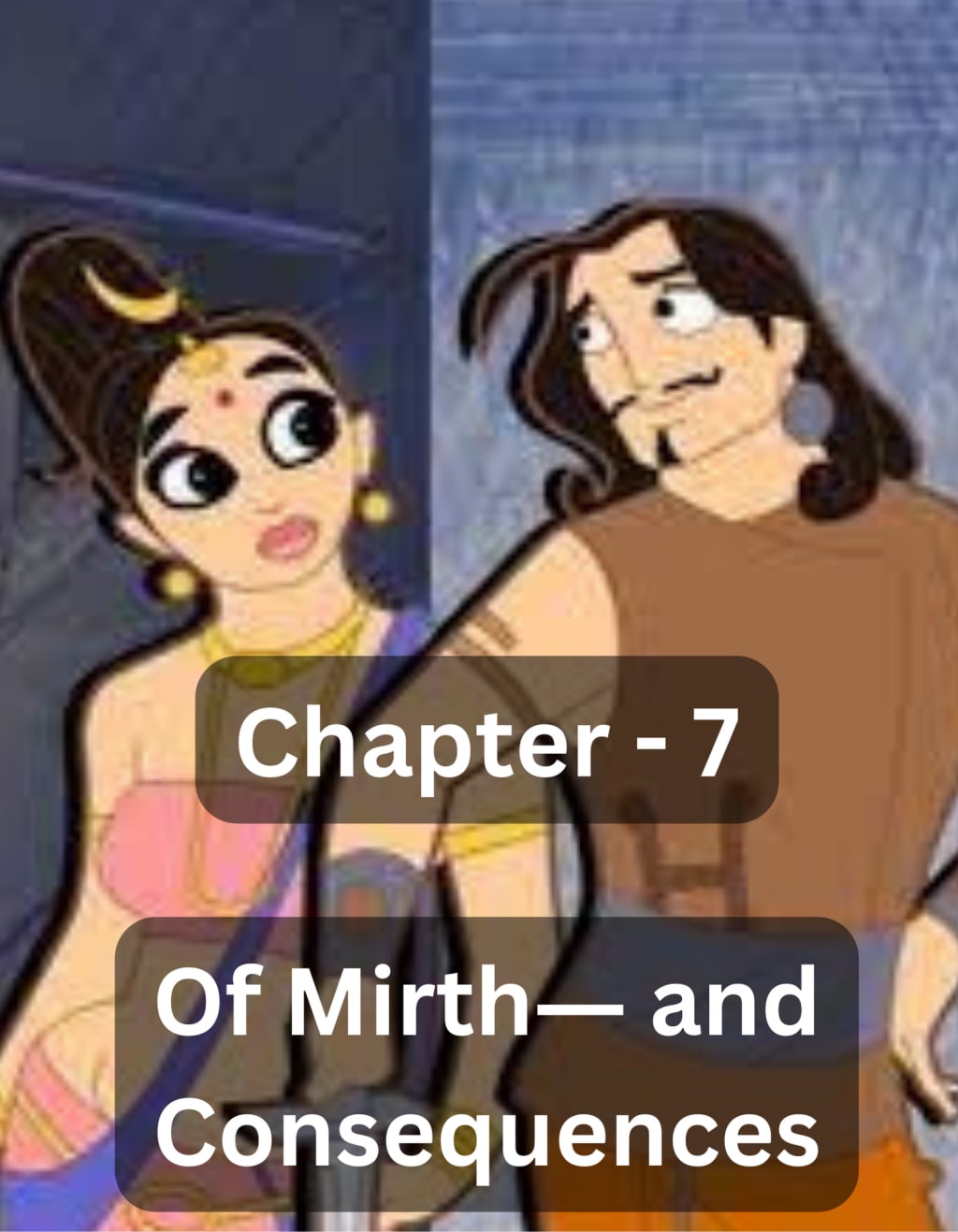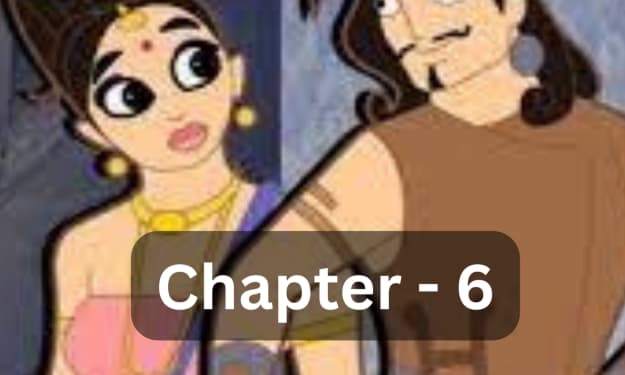Ponniyin Selvan - 1 | Fresh Floods |Chapter - 7 | Of Mirth― and Consequences
Chapter - 7 | Of Mirth― and Consequences

Ponniyin Selvan - 1
Fresh Floods |Chapter - 7 | Of Mirth― and Consequences
The moment he heard the words “succession to the throne,”
Vandhiyathevan decided that he would listen to the entire
conversation. What were these men about to discuss regarding the
succession? What right did they have to do so, anyway? No, his duty
was clear: he would have to do some eavesdropping himself, and
there was no better place for it than his current location.
Azhwarkkadiyaan could go hang himself; who cared what became of
him?
Something was about to happen here: something mysterious and
disquieting enough to ruffle the realm, if possible. For quite some
time now, Vandhiyathevan had been plagued by the niggling
suspicion that the Kadambur Palace was the nerve-centre of strange
happenings: Azhwarkkadiyaan’s odd little speeches; the palace
sentries’ heavy-handedness; Sambuvaraiyar’s belligerent welcome
— if, indeed, it could be called that—the Devaralan’s frenzied call for
sacrifice ... all of these had sparked a discomfort in him that could
not be alleviated. Now here was a God-given opportunity to rid
himself of conjectures, and find out exactly what was happening.
Why on earth would he waste it?
Ah, not even his beloved Kandamaaran could find it in himself to
confide about the evening’s activities—here he was at this
clandestine meeting, having persuaded his friend to sleep in an
isolated balcony! Vandhiyathevan would be sure to give him a piece
of his mind, tomorrow.
By this time, Pazhuvettarayar had begun to speak; the Vaanar
warrior concentrated on every word.
“My purpose in journeying here is to give you news of great
import; it is also the reason for why Sambuvaraiyar has gathered us
all. King SundaraChozhar’s state of health is extremely precarious. I
have made enquiries of the royal physicians; they are all decided in
their opinion: there is not much hope—his days are numbered.”
Pazhuvettarayar paused. “It behooves us now, to come to a decision
on a future course of action.”
“What do the astrologers say?” came a voice from the midst of
the gathering.
“Why consult them about this?” put in someone else. “Haven’t we
all seen a comet late at night, for a while now?”
“The astrologers’ prognosis is merely to postpone the inevitable
by a few weeks,” answered Pazhuvettarayar. “Whatever the
outcome, it is upon us to decide the heir to the Chozha throne—”
“What would be the use of contemplating such a thing?” asked a
hoarse voice. “AdithaKarikalar was announced Crown Prince more
than two years ago, was he not?”
“True—but I should like to know which of us, if any, were
consulted before such a peremptory decision was taken. All of us
here have pledged body and soul to the Chozha dynasty for more
than a hundred years; our clans go back centuries, and have been in
service to the Empire for more than four generations. My great
grandfather sacrificed his life in the Thiruppurambiyam battle; my
grandfather in the conflict at Velur; my father in the battle at
Thakkolam. Everyone here has lost a valued family member, our
sons even, guarding this Empire—today, the war raging in Eezham
has our youngsters standing shoulder to shoulder, destroying our
foes. And yet—none of us were asked for our opinions when it came
to choosing the successor to the throne. You will recall that even
King Dasarathar called for a council to choose the Crown Prince for
Ayodhya; he sent for his ministers, commanders, aides, generals
and feudal lords, convened a mandhiralosanai and made sure their
concerns were heard. SundaraChozha Maharaja, on the other hand
—”
“... may not have asked our advice, it is true—but our illustrious
Treasurer is not quite correct to presume that none were consulted.
After all, PeriyaPiratti, the noble Sembian Mahadevi, and IlaiyaPiratti,
the honourable Kundhavai Devi were both taken into his confidence,
were they not?” asked a faintly mocking voice. “Can Pazhuvettarayar
honestly claim, now, that SundaraChozhar made an arbitrary
decision about his heir?”
A wave of mirth flowed over the audience.
“Ah, you laugh! —how you can find it in yourself to be amused at
this pathetic situation, I shall never quite understand. My heart burns,
my blood boils; I am moved to wonder at the purpose of my pitiful
existence on earth! The Devaralan demanded the sacrifice of a royal
whose dynasty has flourished a thousand years—do me a favour, all
of you, and offer me up to Durga! My clan has made Chozha Nadu
its home for more than a thousand years; you may all cleave my
head from my body with your swords; the Goddess is bound to be
pleased with my blood—and my soul will find some measure of
peace!”
Pazhuvettarayar came to a stop, finally, chest heaving, voice
shaking with as much frenzied emotion as the possessed Devaralan
that evening.
Silence reigned for a while. The west wind whirred through the
courtyard. Trees outside the fort swung madly in the stiff breeze,
their branches rustling and whispering against the fort walls.
“The King of Pazhuvoor must pardon our thoughtless speeches
and laughter—ridicule was very far from our minds; such was not our
intention. You are our peerless leader, and each one of us here is
willing to deem your smallest wish, our command,” supplicated
Sambuvaraiyar, at his humblest. “Yours is the right to lead us; yours
is the path we seek to follow. Pray accept our apologies, my lord.”
“I beg your pardon as well, for having lost my temper. Do, but
listen: this time, a hundred years ago, VijayalayaChozhar reduced
the Mutharayar dynasty to dust and captured Thanjavur; he ranged
himself on the side of the Pallavas and destroyed the Pandiyan
armies in the Thiruppurambiyam Battle. Ever since, the Chozha
Empire has grown by leaps and bounds—I doubt if it possessed the
territories it does today, in the times of great Emperor Karikalar, who
raised the banks of the Kaveri. Today, our magnificent samrajyam
stretches from the tip of the Kumari, to the banks of the River
Thungabhadhra and Krishna. We have Pandiya Nadu, Naanjil Nadu,
ThondaiMandalam, Paagi Nadu, Gangapadi, Nulambampadi,
Vaithumbar Nadu, Seetpuli Nadu, Perumpaanappadi, Kudagu Nadu,
the birthplace of Kaveri, paying tributes as our vassals. Even Chera
Nadu, which has a history of never submitting to others,
acknowledges our suzerainty. Our glorious tiger flag flutters in all
these countries, proclaiming our superiority; by rights, Eezham in the
south, Vengi and RettaiMandalam in the North ought to have fallen
to their knees, before our onslaught. As to why they have not—
surely my friends here are aware of the reasons?”
“Indeed. There are only two: one is AdithaKarikalar, the
MaathandaNaayakar of the Northern Chozha Forces; the other is his
young brother, the Commander of the Southern Armies,
ArulmozhiVarmar—”
“Mazhavarayar speaks the truth. All the kings I knew favoured
time-honoured methods of choosing their generals or commanders;
warriors who had excelled in wars and sported their scars proudly,
with years of experience at their backs were usually deemed most
suitable to lead armies; such was the custom in our Empire too, for
the last hundred years. But now—now, we have the Crown Prince,
quartered with vast armies in the North, supposed to reap victories
against Vengi and RettaiMandalam—and what does he do, instead?
Squats on his hind-quarters in Kanchi, building a palace of gold. I
ask you, respected members of this gathering, scions of
Thamizhagam’s oldest and most valiant families—which of the rulers
of this land has ever built himself a golden palace? Not even
Paranthaka Chakravarthy who vanquished Madurai, Eezham, and
now resides in resplendent glory in the heavenly abode of Kailasam,
ever wished such an extravagant residence for himself. What he did
accomplish, was to present the Chidambaram Temple with a roof of
gold. But witness, if you please, the lofty aims of our revered Crown
Prince! Apparently, the hoary palaces of the Pallava Emperors are
not quite suited to the status of the heir to the throne; he builds a
palace of gold and embeds diamonds and precious stones into its
walls! Not a single measly copper coin of the treasures he carried
away from Nulambampadi, Gangapadi or Kudagu has made it back
to the Chozha royal treasury—”
“The Golden Palace is complete, then?”
“I have reliable information from my spies that work is, indeed, at
an end. SundaraChozhar has received quite a few missives from our
Prince as well. Apparently, his beloved and dutiful firstborn wishes
his father to reside in his obscenely opulent edifice, for a while.”
“Is the Maharaja to stay in Kanchi?” asked a worried voice.
“Never fear. My trusted brother and I, together, shall make sure
that such an eventuality will never come to pass. None can enter the
Thanjai fort without our express approval, seek an audience with the
King or present any kind of olai to him. I have, in fact, made sure that
two or three such palm-leaves have been successfully intercepted.”
“Ah! Long live Pazhuvettarayar! Praise be to his strategies!” rose
several voices in a shout. “May his valour rise to greater heights!
Truly, you are a Chanakya among us!”
“There is more, my friends. If you thought the Crown Prince off
his royal mind—wait until you listen to the antics of Prince
ArulmozhiVarmar, sent to fight in Ilankai. Reflect, if you please, on
the methods of waging war: on our own experiences thus far and on
traditions that have been in place for a hundred years. Should we
ever march into an enemy’s lands, our armies seize what food they
can from the surrounding areas; our rewards are the loot plundered
from their treasuries—and they are the chief source of payment to
our soldiers. The surplus must be transferred to the royal treasury in
the capital. But listen to Prince ArulmozhiVarmar’s high-flown
sentiments, if you please: he believes that plundering conquered
land is a despicable act, and wishes for food to be sent from
Thamizhagam! The good God above knows that I have sent more
than ten shipments of grains and pulses—”
“What idiocy is this!” “Such foolishness!” rose outraged voices.
“Such things have never been heard of!” “Why must we put up with
this injustice?”
“Do but listen to ArulmozhiVarmar’s odd explanation for his
outlandish conduct: he refuses to seize local sources as that would
lead to discontent and misery among the populace. Our battle, he
believes, is with Eezham’s rulers; the people should not be made to
suffer for his sake. Once he has vanquished them and their armies,
he would much prefer to secure their approval and happiness, before
he establishes his rule over them!”
“I have seen and heard many unnatural things in battle, but to
acquire the goodwill of the people about to be invaded ...” mumbled
one member of the gathering, disbelief evident in his voice. “What
does he wish us to do—fall at their feet?”
“Witness the result of these hare-brained tactics: both our princes
have ensured that the treasury and granaries are almost empty. And
I am placed in the uncomfortable position of heaping taxes on you, to
make good the deficit! Such is my duty, after all—and if it were not
for the fact that the Empire’s fate weighs heavily on my conscience, I
would have resigned this revolting post years ago!”
“Never—never! The Pazhuvoor King is the only reason the
Empire has not crumbled into dust, by now; your iron will and
conscience ensures our protection. But have you not sought an
audience with the King, regarding such pressing concerns?”
“A thousand times have I tried—only to be repulsed categorically.
Should I ever require His Majesty’s advice, I am, if you please,
supposed to bow down to the superior guidance of PeriyaPiratti or
IlaiyaPiratti! I tell you, the King has lost the will or ability to think for
himself—at no moment does he seek our opinions in vital matters.
His beloved Sembian Mahadevi stands in the role of a mentor; her
words are as holy as the Vedhas, to him. That, or he wishes us to
seek the opinion of his beloved daughter Kundhavai—he believes
her understanding to be most superior, and capable of addressing all
our concerns. I! —I and other ministers who have grown grey in our
service, are expected to stand at attention in front of this chit of a girl
—a sheltered girl whose dainty feet have not stepped beyond
Kollidam in the North and River Kudamurutti in the South—and beg
her precious indulgence! Have you ever heard of women being
allowed such free rein in matters of state, in any kingdom? How long
do you expect me to bear such insult to my name and fame? But
there is a way out: you could come to a unanimous decision and
demand my resignation; I should be very glad indeed to free myself
from these stupid affairs, and consign myself to my home—”
“Never! The Pazhuvoor King must not even think to utter such
terrible words,” Sambuvaraiyar called out. “The Chozha Empire
stands today on the shoulders of thousands of warriors,
strengthened by the blood of four generations of our men; nothing
will induce us to see it ground into dust in our lifetime!”
“My friends and compatriots—I rest my case,” finished
Pazhuvettarayar. “Our Empire is now governed by females; we have
a veritable Alli Rajyam on our hands. How do we rectify this terrible
state of affairs?” He paused. “What do we do?”
About the Creator
Jeevanantham S
Hi Friends !!!.






Comments
There are no comments for this story
Be the first to respond and start the conversation.